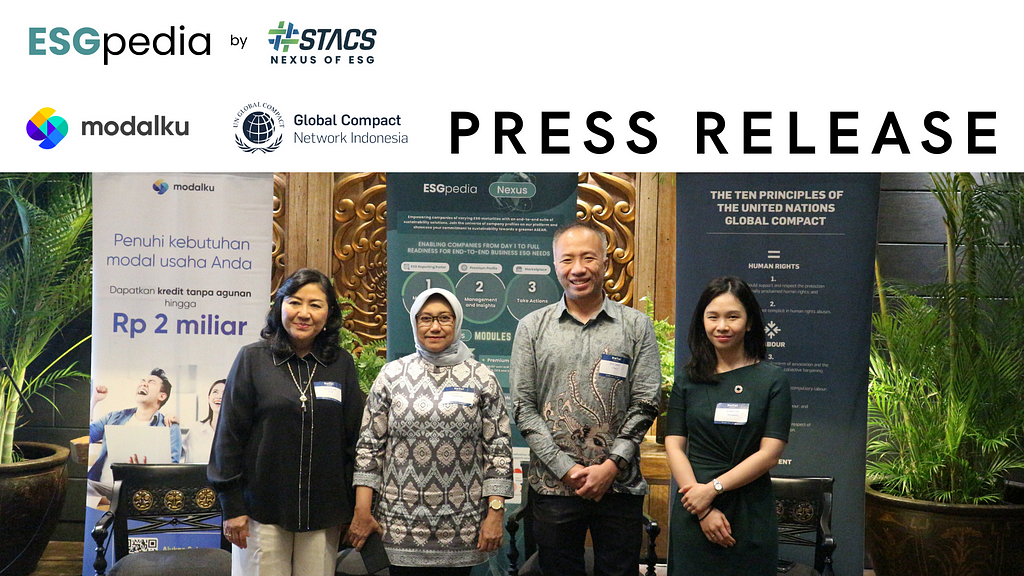JAKARTA, 2 February 2024 –
Modalku, in collaboration with STACS and Indonesia Global Compact Network (IGCN) organised an ESG Gathering on “Empowering Indonesian MSMEs through ESG Reporting and Sustainable Practices”. The event is intended as a platform for companies and MSMEs to understand the importance of ESG reporting and the advantage of implementing sustainable practices in their business strategies, especially in the midst of increasing regulatory and investor requirements for companies to act on climate change and other environmental issues.
Improving ESG awareness through reporting allows businesses to be conscious about what sustainability issues to address. Despite many resources being available for large corporations, support and education still need to be given for MSMEs. To address this gap, Modalku has collaborated with STACS, a Singapore-headquartered ESG data and technology solutions company, to promote STACS’s ESGpedia platform for Indonesian MSMEs to begin their ESG reporting journey. ESGpedia provides a structured overview of ESG topics and can automatically convert operational data such as fuel, refrigerant, and electricity consumption into Greenhouse Gas (GHG) emissions in accordance with ISO 14064-1 methodologies and the GHG Protocol, localized to Indonesia.
Benjamin Soh, Founder & Managing Director STACS, explains, “ESGpedia by STACS aims to address the ESG data gap in the ASEAN market. By using ESGpedia, MSMEs can get free access to a digital platform, which simplifies various ESG reporting standards and frameworks. Specifically in Indonesia, we realise that some institutions or companies are already required by the government to report on ESG metrics. Realizing that this could impact MSMEs, including those in the supply chain ecosystem of large corporations, we want to support the ESG journey of Indonesian MSMEs by providing access to a platform that allows them to easily disclose, calculate their GHG emissions, and amplify their ESG credentials.”
Sustainability and ESG Lead Modalku Group, Annette Aprilana, shares, “Embedding sustainable practices into a company’s core business not only opens up opportunities to secure more funding, but also helps to maintain a business’ competitiveness, while being mindful about environmental and social issues. At Modalku, we want to ensure the MSMEs in our ecosystem are equipped with ESG reporting knowledge and resources to continue on a growth trajectory and be able to answer to their stakeholders about ESG when required to. The solution we see in ESGpedia makes the reporting process for MSMEs more straightforward and lowers the barrier to sustainability.”
Through reporting on ESG metrics, businesses can create an action plan on what material ESG topics they need to address and improve on. They can further make a positive impact by aligning their business activities to the United Nations’ 17 Sustainable Development Goals (SDGs) to end poverty, improve welfare, and protect the planet. The Indonesian government has also developed the SDGs Roadmap to support the SDGs. When these global goals are translated to a company level, businesses can therefore be more conscious about implementing sustainable practices into their operations, where the role of MSMEs is crucial to achieving this agenda.
Dr. Vivi Yulaswati, M.Sc, Deputy for Maritime & Natural Resource / Head of SDGs National Secretariat (BAPPENAS/Ministry of National Development Planning), emphasises, “MSMEs hold a strategic position in the national economy, contributing significantly to the expansion of employment by absorbing 99% of the workforce. They play a crucial role in increasing community income and driving economic growth, contributing over 60% to the GDP. One of the challenges facing MSMEs is access to financial services, which is identified as a key point in the SDGs Roadmap. We project a target of achieving a 42% access rate for MSMEs to financial services by 2030. Hence, collective action is needed from the government, relevant stakeholders, and MSMEs to achieve this goal.”
Josephine Satyono, Executive Director Indonesia Global Compact Network (IGCN), added, “MSMEs can also implement sustainable business strategies through the 10 Principles of the United Nations Global Compact (UNGC) covering the areas of human rights, labour, the environment, and anti-corruption. Key actions that the MSMEs can take to start is by understanding the global goals, prioritizing your SDGs actions to maximize impact, setting ambitious targets, embedding the goals into your core business, and reporting your contribution to the SDGs. By incorporating the 10 Principles of UNGC into strategies, policies and procedures, MSMEs can set their businesses up for long-term success.”
ESG disclosures are of great importance for sustainability as they serve as catalysts for responsible business conduct, enhance transparency and accountability, mitigate risks, attract investments, and drive long-term value creation. With the right financial support and ESG knowledge, MSMEs are armed with the proper resources to compete in the market.
About Modalku
Established in 2016, Modalku is the pioneer of digital lending platforms in Indonesia. It connects Micro, Small, and Medium-Sized Enterprises (MSMEs) with individual and institutional lenders. In 2018, Modalku won the Micro Enterprise Fintech Innovation Challenge from the United Nations (UNCDF – UN Pulse Lab) and became the only P2P lending startup in South East Asia to receive the international award The Fintech100 from KPMG. In 2020, Modalku also received an award from Iconomics as Indonesia’s Most Popular Digital Financial Brands 2020.
Modalku is trademarked and owned by PT Mitrausaha Indonesia Grup. Modalku has been licensed by OJK as peer to-peer lending based on technology with a license letter KEP-81/D/05/2019 and has a mission to develop the Indonesian economy by supporting MSME growth through peer-to-peer lending activities.
For more information, please visit www.modalku.co.id
About STACS
STACS (Hashstacs Pte Ltd) is Asia’s leading ESG data and technology company, headquartered in Singapore. Its ESGpedia platform powers the ESCAP Sustainable Business Network (ESBN) Asia-Pacific Green Deal digital platform, the ASEAN Single Accesspoint for ESG Data (SAFE) pilot initiative, and the Monetary Authority of Singapore’s (MAS) Greenprint ESG Registry. With more than 5 million sustainability data points, ESGpedia serves as the Nexus of ESG, digitally empowering corporates, SMEs, and the financial sector to ensure compliance towards ESG regulations and attain their ESG goals. For more information, please visit www.stacs.io.
About Indonesia Global Compact Network (IGCN)
Indonesia Global Compact Network (IGCN) is a local network of the United Nations Global Compact in Indonesia. It was launched on April 8, 2006 in Jakarta during the UNESCAP Conference attended by all delegates. Twenty-two companies and organizations made a mutual commitment and signed the pledge to support, promote, and implement the United Nations Global Compact Principles. IGCN’s vision is to be a respectable agent of change in accelerating country transformation towards the achievement of human rights, competitive labor, sustainable environment, and ethical business practices. Its mission is to promote, facilitate and implement the UN Global Compact Principles in Indonesia.
For more information, please contact:
Grace Lim
Senior Marketing Manager
Email: [email protected]
Natasha Helena
Junior Manager, Communications Modalku
Phone: +62 896 6276 5084
Email: [email protected]
Fany Aulia Suci Lestari
Senior Communications Officer Modalku
Phone: +62 813 9811 5990
Email: [email protected]





